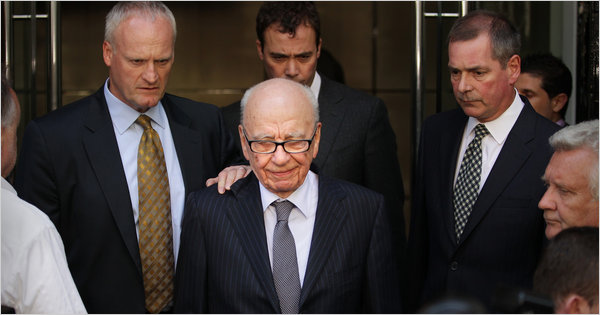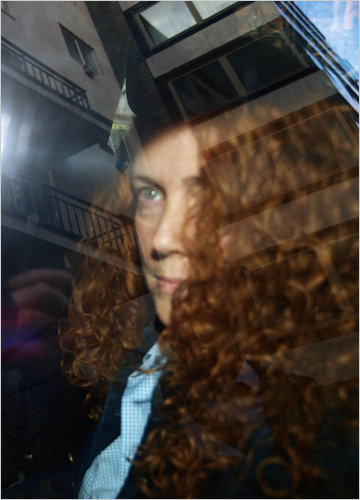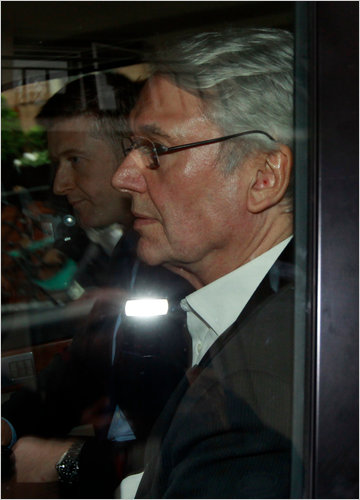Les Hinton, Rebekah Brooks’s predecessor at News International and publisher of Wall Street Journal, also quits
Hinton was the chief executive of News International during the period when the
recently revealed hacking of the cellphone of the kidnapped and murdered schoolgirl
Milly Dowler took place, in addition to the NOTW’s
previously revealed phone hacking of numerous other individuals.
The article was posted late Friday at the New York Times:
2 Top Deputies Resign as Crisis Isolates Murdoch

Rupert Murdoch on Friday before meeting with reporters.
By JOHN F. BURNS and JEREMY W. PETERS
LONDON—The crisis rattling Rupert Murdoch’s global media empire claimed the two highest-level executives yet on Friday after days of mounting pressure from politicians and investors on two continents.
Les Hinton, the publisher of The Wall Street Journal since 2007, who oversaw Mr. Murdoch’s British newspaper subsidiary when voice mail hacking by journalists was rampant, and Rebekah Brooks, who has run the British papers since 2009 and become the target of unrelenting public outrage, both resigned in the latest blow to the News Corporation and its besieged chairman.
At first incensed by the assault on his company’s reputation, Mr. Murdoch insisted as late as Thursday that the executives had performed “excellently” in dealing with the crisis since it erupted two weeks ago. He was said to be loath to lose either of them, and became convinced that they had to leave only over the last several days, as executives and outside advisers flew in to help manage the crisis from the company’s gleaming granite and glass offices in Wapping, East London.
In arriving at the final decision, Mr. Murdoch was joined by his two sons, James and Lachlan, and Joel I. Klein, a senior News Corporation executive and former New York City Schools chancellor.

Rebekah Brooks, who has run Mr. Murdoch’s British
newspapers since 2009, resigned on Friday.
The resignations came on a day when Mr. Murdoch made a series of public mea culpas. He wrote a letter to be published in all British newspapers over the weekend acknowledging that the company did not address its problems soon enough. “We are sorry,” it begins.
He also visited the family of a murdered 13-year-old girl, Milly Dowler, whose voice mail was hacked by reporters at The News of the World while she was still listed as missing. According to the Dowler family’s lawyer, Mark Lewis, Mr. Murdoch held his head in his hands and apologized for the actions of his employees, who deleted phone messages after the girl’s mailbox had been filled so they could collect more new messages.
Mr. Lewis said that Mr. Murdoch apologized “many times,” and that he was “very humbled, he was very shaken and he was very sincere.”
Whether these actions will do anything to quiet the backlash against the News Corporation is unclear. Mr. Murdoch, Ms. Brooks and James Murdoch, the company’s deputy chief operating officer and Rupert’s younger son, are set to testify next week before Parliament, where they will face questions from politicians who have become suddenly unafraid to publicly condemn the man whose favor they once saw as a key to political success.

Les Hinton, the publisher of The Wall Street
Journal since 2007, also resigned.
Mr. Murdoch has become an increasingly isolated figure, not only in Britain but within his own company. The departure in recent years of top executives who often provided a counterweight to his famous irascibility and stubbornness has left him surrounded by fewer people who can effectively question his decisions. He initially rejected Ms. Brooks’s offer to resign from News International, his British subsidiary, despite advice to accept it from senior News Corporation executives, said people briefed on the company’s discussions.
Ms. Brooks, who was editor of The News of the World when the abuses began in 2002, repeatedly told the Murdochs that she knew nothing of the hacking and that she would be exonerated when all the facts came out.
In her farewell message, Ms. Brooks acknowledged that she had become a distraction. “The reputation of the company we love so much, as well as the press freedoms we value so highly, are all at risk,” she wrote. “As chief executive of the company, I feel a deep sense of responsibility for the people we have hurt and I want to reiterate how sorry I am for what we now know to have taken place.”
On Friday, former staff members at The News of the World questioned why Ms. Brooks did not resign earlier. “Our paper was sacrificed to save her career, and now she’s gone as well,” one former employee said, requesting anonymity because he did not want to jeopardize his position in severance negotiations. “Who knows why they’ve chosen to do it now, as she’ll have to appear before the select committee anyway.”
Until Friday, Mr. Hinton had been largely an offstage figure in the scandal. But questions grew about what he knew about the improper practices going on at the newspapers under his watch, even though he has testified twice before Parliament saying that he believed the hacking was limited to one rogue journalist and a private investigator employed by The News of the World.
Letting Mr. Hinton go was an especially fraught decision for Mr. Murdoch. The two had worked together for 52 years, since Mr. Hinton joined Mr. Murdoch’s first paper, The News of Adelaide in South Australia, when he was 15. Moreover, Mr. Hinton ran The Wall Street Journal, Mr. Murdoch’s most cherished American newspaper.
In a note to his employees, Mr. Hinton said Friday was “a deeply, deeply sad day for me.”
Employees at The Journal had mixed reactions to Mr. Hinton’s departure. Alan Murray, a deputy managing editor, wrote on Twitter: “Les Hinton was a great leader, and did much to support the advancement of WSJ in print and digital platforms. He will be much missed.”
But a Journal employee who did not want to be identified criticizing his employer expressed anger over the companywide e-mail from Robert Thomson, the paper’s editor, extolling Mr. Hinton. “It’s enraging that the first thing our editor says to us about this whole mess is that as journalists we owe a debt of gratitude to the guy who had to resign because he was at the helm of the papers that did this stuff,” this person said.
The scandal also seemed poised to claim other prominent heads outside the Murdoch domain, with the gravest immediate threat falling on Sir Paul Stephenson, the chief of Scotland Yard. His position—he is formally known as the commissioner of the Metropolitan Police—has been one of the most prestigious in the country, but in the past 48 hours, he too has fallen under the cloud of suspicion that the scandal has thrown over the interlinked worlds of Britain’s press, politicians and police.
The country was shocked this week by the seemingly unrepentant performance of three top Scotland Yard figures, two now retired, who oversaw the earlier, largely toothless, investigations of The News of the World. A new inquiry begun this year has resulted so far in seven arrests, including that of Prime Minister David Cameron’s former media chief, Andy Coulson, who succeeded Ms. Brooks as editor of The News of the World in 2003.
But the police chief’s problems worsened sharply when reports began circulating on Thursday—confirmed in a Scotland Yard statement—that Sir Paul had approved nearly $40,000 in payments in 2009 and 2010 to a personal media consultant who had been the second-ranking editor at The News of the World when much of the hacking took place under the editorships of Ms. Brooks and Mr. Coulson. That man, Neil Wallis, was arrested on Thursday, and held, like Mr. Coulson, for hours of questioning before being released on bail.
Scotland Yard acknowledged having paid Mr. Wallis $1,600 a day, and said that Sir Paul had dined on eight occasions with News of the World editors—five of those with Mr. Wallis—while Scotland Yard officers were investigating the paper. Reports in British newspapers said that the commissioner had made no mention of the dinners, or of the subsequent media consultancy contract with Mr. Wallis, when he met Mr. Cameron. That led to an outraged statement from Downing Street, where a Cameron spokesman, speaking on the condition of anonymity, said on Friday that Sir Paul had “urgent questions to answer.”
Ms. Brooks’s resignation had seemed ever more likely when late Thursday, BBC television broadcast an interview with Prince Al-Waleed bin Talal of Saudi Arabia, the News Corporation’s second-largest shareholder, in which he said that if Ms. Brooks was involved in wrongdoing, “for sure she has to go.”
She was replaced by Tom Mockridge, the head of Sky Italia, the News Corporation’s Italian satellite broadcaster.
Ms. Brooks said she would focus on “correcting the distortions and rebutting the allegations” against the company and herself, and would cooperate with the police inquiry into phone hacking and payments to corrupt police officers. She also praised Mr. Murdoch’s “wisdom, kindness and incisive advice” and his son James’s “great loyalty and friendship.”
After she quit, James Murdoch praised her as “one of the outstanding editors of her generation.” And he took the occasion to say that while the company “has made mistakes,” and accepted the need for public scrutiny, it intended to answer “unfair attacks by setting the record straight.”
But Ms. Brooks’s removal could make James the next in the firing line over News International’s erratic responses to the scandal. Attention at next week’s parliamentary grilling is likely to center on his testimony to Parliament at an early stage of the scandal dismissing the abuse at The News of the World as rogue and isolated episodes and on his action in approving a secret $1.1 million settlement to one of the phone hacking victims.
James’s role has also caused strains within the Murdoch clan, particularly with his sister Elisabeth, according to one person who has done business with the family but did not want to be identified discussing internal matters. But whatever their differences, the Murdoch children pull together in times of crisis.
“They’re still brother and sister,” this person said. “They just play in this big world. It’s a sibling rivalry kind of thing, but it’s still blood. And they both know the company is their fortune.”
The Times also has
this:
Text of Rebekah Brooks’s Resignation Letter
Rebekah Brooks, the chief executive of News International, announced her resignation on Friday. Following is the text of the letter, as transmitted by The Associated Press.
“At News International we pride ourselves on setting the news agenda for the right reasons. Today we are leading the news for the wrong ones.
“The reputation of the company we love so much, as well as the press freedoms we value so highly, are all at risk.
“As chief executive of the company, I feel a deep sense of responsibility for the people we have hurt and I want to reiterate how sorry I am for what we now know to have taken place.
“I have believed that the right and responsible action has been to lead us through the heat of the crisis. However my desire to remain on the bridge has made me a focal point of the debate.
“This is now detracting attention from all our honest endeavors to fix the problems of the past.
“Therefore I have given Rupert and James Murdoch my resignation. While it has been a subject of discussion, this time my resignation has been accepted.
“Rupert’s wisdom, kindness and incisive advice has guided me throughout my career and James is an inspirational leader who has shown me great loyalty and friendship.
“I would like to thank them both for their support.
“I have worked here for 22 years and I know it to be part of the finest media company in the world.
“News International is full of talented, professional and honorable people. I am proud to have been part of the team and lucky to know so many brilliant journalists and media executives.
“I leave with the happiest of memories and an abundance of friends.
“As you can imagine recent times have been tough. I now need to concentrate on correcting the distortions and rebutting the allegations about my record as a journalist, an editor and executive.
“My resignation makes it possible for me to have the freedom and the time to give my full cooperation to all the current and future inquiries, the police investigations and the CMS (Culture, Media and Sport Committee) appearance.
“I am so grateful for all the messages of support. I have nothing but overwhelming respect for you and our millions of readers.
“I wish every one of you all the best.
“Rebekah”
Peter Catapano, the
NY Times online Opinionator,
writes:
At Slate Jack Shafer made his prediction on who would be next to fall: Murdoch’s son James, the chairman of News Corporation’s Europe and Asia divisions:
As the Telegraph reported this week, as long as Brooks stayed on the payroll, she shielded James from some of the more vociferous attacks. She, after all, was News of the World editor when Dowler’s phone was hacked. But Brooks’ resignation exposes James Murdoch to the fury now, which he can’t possible endure.
Rupert knows this, and knows that he must soon sacrifice his favorite son. Murdoch’s predicament illustrates why no parent should have only one offspring—a backup unit must be kept at all times in case something dreadful happens to the child you’re depending on. It’s Murdoch’s good luck that he has two children who can replace James while he does his time in Siberia. Both Elisabeth, a media tycoon in her own right, and Lachlan, the eldest son and previous heir apparent, could take James’ place in the News Corp. hierarchy. Neither carries any phone-hacking scandal taint, and both are ambitious. …
Would Murdoch really sack his son? I don’t see why we should rule out infanticide in this case.
Posted by Lawrence Auster at July 16, 2011 05:05 AM | Send


